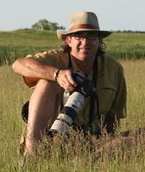 I walked into Julie's studio yesterday afternoon to ask her something and a flash of zippy-swoopy movement in the birches just outside the windows caught my eye. I knew right away it was a warbler and not one of the 27 goldfinches, dozen titmice, or half-dozen chickadees that were flitting from trees to feeders to bird bath.
I walked into Julie's studio yesterday afternoon to ask her something and a flash of zippy-swoopy movement in the birches just outside the windows caught my eye. I knew right away it was a warbler and not one of the 27 goldfinches, dozen titmice, or half-dozen chickadees that were flitting from trees to feeders to bird bath.But how did I know it was a warbler?
I'm not completely sure. There are clues that the human brain can gather, sort, and decipher in a matter of milliseconds. All I saw was one quick swoop from one birch to another and my brain instantly said "Warbler!" If I had to 'splain it, I'd say it was something about the size, color, and style of movement—all things that I'd seen before, deduced, and confirmed. But I'm only grasping for an explanation here. All I know is that I instantly knew what family that feathered thing belonged to, and I was determined to see it better.
 The warbler, in a show of fair play, hopped from the back of the bird tree to our side, which sent us scampering for binoculars and cameras. It was a female yellow-throated warbler! And this surely signalled the start of fall migration—in late July!
The warbler, in a show of fair play, hopped from the back of the bird tree to our side, which sent us scampering for binoculars and cameras. It was a female yellow-throated warbler! And this surely signalled the start of fall migration—in late July! For the next 10 minutes we watched her glean insects and tiny caterpillars from the birch leaves. Man, our gray birches ALWAYS deliver the warblers. This might be the single most bird-friendly tree species on our farm, even though they do not do well in our clay soil and hot, dry summers.
For the next 10 minutes we watched her glean insects and tiny caterpillars from the birch leaves. Man, our gray birches ALWAYS deliver the warblers. This might be the single most bird-friendly tree species on our farm, even though they do not do well in our clay soil and hot, dry summers.
Each late summer through mid-fall we get our annual influx of yellow-throated warblers. They nest down along the creek on Goss' Fork and after the breeding season is over, they come a-hill-toppin' up to our ridge top farm, looking for food or perhaps just exploring before the start of migration.
One of our first falls here at Indigo Hill, as we were out on the deck enjoying a fine morning of birding, a male yellow-throated warbler dropped out of the sky and landed on our stone chimney just two feet from us. It then flew to the deck railing a foot from us. Then it landed on the tripod leg two inches from my knee. It cocked its head as if to make certain we noticed his fine fall plumage, newly molted in for migration. Then he swooped over to our newly planted sycamore. This last act was almost too much for me—I grew up calling this warbler by its original name sycamore warbler.
 My final view of Lady Sycamore, just before she slipped away. I dig her golden slippers!
My final view of Lady Sycamore, just before she slipped away. I dig her golden slippers!After I left Julie's studio, heading back downstairs to do some podcast recording and editing, a young male American redstart and a female cerulean warbler also came through the birches. I missed them, but I certainly didn't miss the start of fall migration!






3 comments:
The best birding of the year, comin' right up. I looove August birding at Indigo Hill! (Also like how you refer to the birch tree as the bird tree--oh yes it is!)
Dang! Stoopid tpyo.
Well, I am not surprised. If these warblers are anywhere near my neck of the woods, it has been cool and rainy. I would head for Ohio, too!
Post a Comment